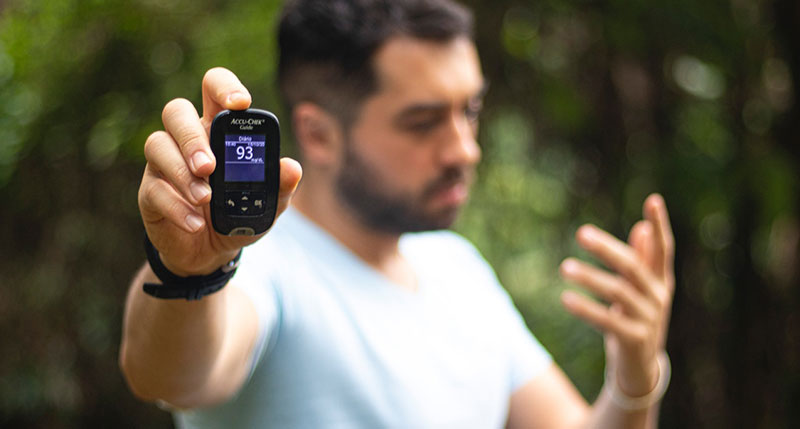November is American Diabetes Month. It’s estimated that more than 30 million adults over age 18 currently have diabetes, with another 84 million showing signs of prediabetes. For those over age 65, one in four have diabetes and its associated complications.
Did you know that diabetes can have a significant impact on your vision, causing both blurred vision and in advanced cases, partial to full vision loss?
Here are five steps to take to reduce or prevent your risk for developing diabetic eye disease and help preserve good vision for years to come:
- Visit your optometrist for a comprehensive eye exam that includes dilation at least once each year.
Diabetic eye disease, including diabetic retinopathy, doesn’t have noticeable symptoms in its early stages. When looking at your eyes while dilated, your optometrist can more closely examine the retina and the optic nerve for signs and symptoms of damage, likely before you notice any changes or blurriness in your vision. If you are diagnosed with diabetic retinopathy, your optometrist will begin treatment immediately and monitor the health of your eyes closely and regularly to prevent further damage to your eyesight.
- Get your blood sugar under control.
When your blood sugar—also called blood glucose level — is too high, you may experience blurry vision. That happens because a high level of glucose can affect the shape of your eye’s natural lens, which helps to focus your vision. When you carefully monitor your blood glucose levels and get it to stabilize, the lens shape typically goes back to normal, and the blurriness caused by this symptom clears up. However, when high blood sugar levels damage the blood vessels in your eyes and specifically your retina, that damage is permanent. It’s critical to follow your doctor’s advice and closely monitor and maintain control of your blood sugar levels to prevent these problems and preserve your eyesight.
- Monitor and maintain cholesterol and blood pressure levels
While this is good advice for everyone, it’s especially important for people with diabetes to watch both blood pressure and cholesterol levels closely. Why? When they aren’t monitored and kept within acceptable levels, both of these conditions can increase your risk for developing eye disease that results in vision loss. However, by keeping these levels in check, your overall health will benefit, and you’ll also be at a lower risk for developing heart disease or stroke.
- Quit smoking.
If you smoke, you’re at increased risk for a large number and variety of diseases, and unless you’ve been hiding under a rock, you likely know it. However, if you have diabetes and you continue to smoke, you have a higher risk for developing diabetes-related diseases of the eye and going blind. That should be a wake-up call! Smokers with diabetes have a much higher risk for diabetic retinopathy and damaged blood vessels within the eye that steal your vision. The other severe eye complications you could develop include dry eye disease, age-related macular degeneration, cataracts, optic nerve problems, increased risk for glaucoma, and uveitis (an inflammation of the middle layer of the eye wall that causes red eye, pain and vision problems.) Start your path to quit smoking today!
- Exercise
Yes, exercise. You can even call it “exerc-eyes” if it helps you remember that movement and working up a sweat has benefits for your eyes. In addition, exercise and a healthy lifestyle are also helpful in controlling blood glucose levels and, therefore, for getting diabetes under control. So, go out and walk around the block at your lunch hour. Take the stairs instead of the elevator. Park an extra few rows away from your destination and walk. Get your 10,000 steps per day. Your eyes—and your entire body—will thank you!
A diabetes diagnosis can be considered as a wake-up call to take these specific steps to improve your health so you can save your vision. By taking matters into your own hands and actively monitoring blood sugar levels, you can dramatically reduce the likelihood that you will develop severe eye disease as a result of diabetes.
Call us today to schedule your comprehensive eye exam to stay one step ahead of diabetic eye disease and other health concerns that can affect your vision. We’re here to help you see your very best now, and for years to come!

Recent Comments